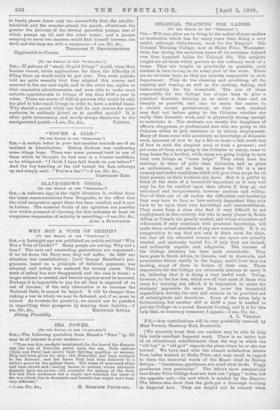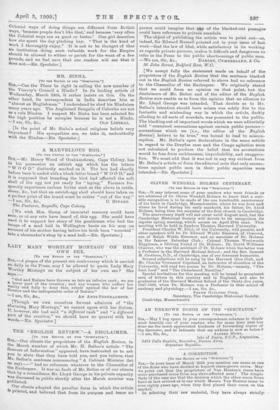COLONIAL TRAINING FOR LADIES. [To TUE EDITOR OP TILE SPECTATOR."
J SIR,—Will you allow me to bring to the notice of your readers an institution which has for many years been doing a very useful, •although little-known, work for the Empire? The Colonial Training College, now at Stoke Prior, Worcester- shire, has during the seventeen years of its existence trained over four hundred ladies for Colonial life. The subjects taught are all those which pertain to the ordinary work of a house. They are taught as practically as possible, each student in turn having to do every part of the work. There are no servants kept, so they are entirely responsible in each department. They do the cleaning and scrubbing, all the washing and ironing, as well as the cooking, baking, and butter-making for the household. The aim of those responsible for the College has always been to give a practical domestic training iii as short a time and as cheaply as possible, and also to make the course to a certain extent probationary, so that each student may find out before going to the Colonies whether she really likes domestic work, and is physically strong enough to undertake it. The students are mostly the daughters of officers, clergymen, or professional men who are going to the Colonies either to join relations or to obtain employment. Many of them come with absolutely no knowledge of domestic work, ignorant of how to lay a. fire or make a bed, much less of how to cook the simplest meal or wash a garment ; and yet some of them are going to the Colonies to marry, Borne to keep house for a brother, while many are going hoping to earn their own livings as "home helps." They often have the making, in them of quite ideal Colonists, and as great an enthusiasm, and as keen a desire for life in a new country and under conditions which will give them scope for all their powers, as their brothers can have. But it is pitiful to think of the state of a household dependent, as it very well may be, for its comfort upon their efforts if they go out untrained and inexperienced, however anxious and willing. Few of them can at all realise the difficulties and hardships they may have to face, or how entirely dependent they may have to he upon their own knowledge and resourcefulness. They come from a class who find it very difficult to get employment in this country, but who in many places in South Africa or Canada are greatly needed, and whose education and refinement, if only combined with practical knowledge, will make them valued members of any new community. It is no exaggeration to say that not only is there room for them, but that all the educated women we can spare are actually wanted, and anxiously waited for, if only they are trained, and ordinarily capable and adaptable. The success of the College students bas been most remarkable. They have gone to South Africa, to Canada, and to Australia, and numberless letters testify to the happy, useful lives they are leading, many of them in homes of their own. Those responsible for the College are extremely anxious to carry it on, believing that it is doing a very useful work. Owing, however, to the low fees, which are all that most of those who come for training can afford, it is impossible to make the students' payments do more than cover the household expenditure, leaving the rent and salaries to be provided out of subscriptions and donations. Some of the extra help is forthcoming, but another £50 or 2100 a year is needed to put the College on a sound financial footing, and it is for this help that, as honorary treasurer, I appeal.—I am, Sir, &c.,
A. L. VERNON.
P.5.—Any contributions will be very gratefully received by Miss Vetnon, Hanbury Hall, Droitwich.
[We sincerely trust that our readers may be able to help this really excellent Imperial work. There is no better test of an educational establishment than the way in which the "old boy" or "old girl" regards the place where he or she was trained. We have read with the utmost satisfaction letters from ladies trained at Stoke Prior, and may recall in regard to them the immortal words of the Maori chief to Bishop Selwyn: "Gentleman gentleman not mind what he do. Piggy gentleman very particular." The letters show conclusively that Stoke Prior College does not turn out " piggy " ladies, but the opposite sort,—the sort which is needed by the Empire. The letters also show that the girls get a thorough training in Imperial tact. They are taught not to remark when Colonial ways of doing things. are different from British' Ways,' because people don't like that,' and because 'very often the Colonial ways are as good or better.' One girl describes how she spent the day pitching bay. "That is the kind of Work I thoroughly enjoy." It is not to be thought of that an institution dOing such valuable work for the Empire Should be allowed to wither or perish for the want of a few Pounds, and we feel sure that our readers will see that it does not.—En. Spectator.]











































 Previous page
Previous page